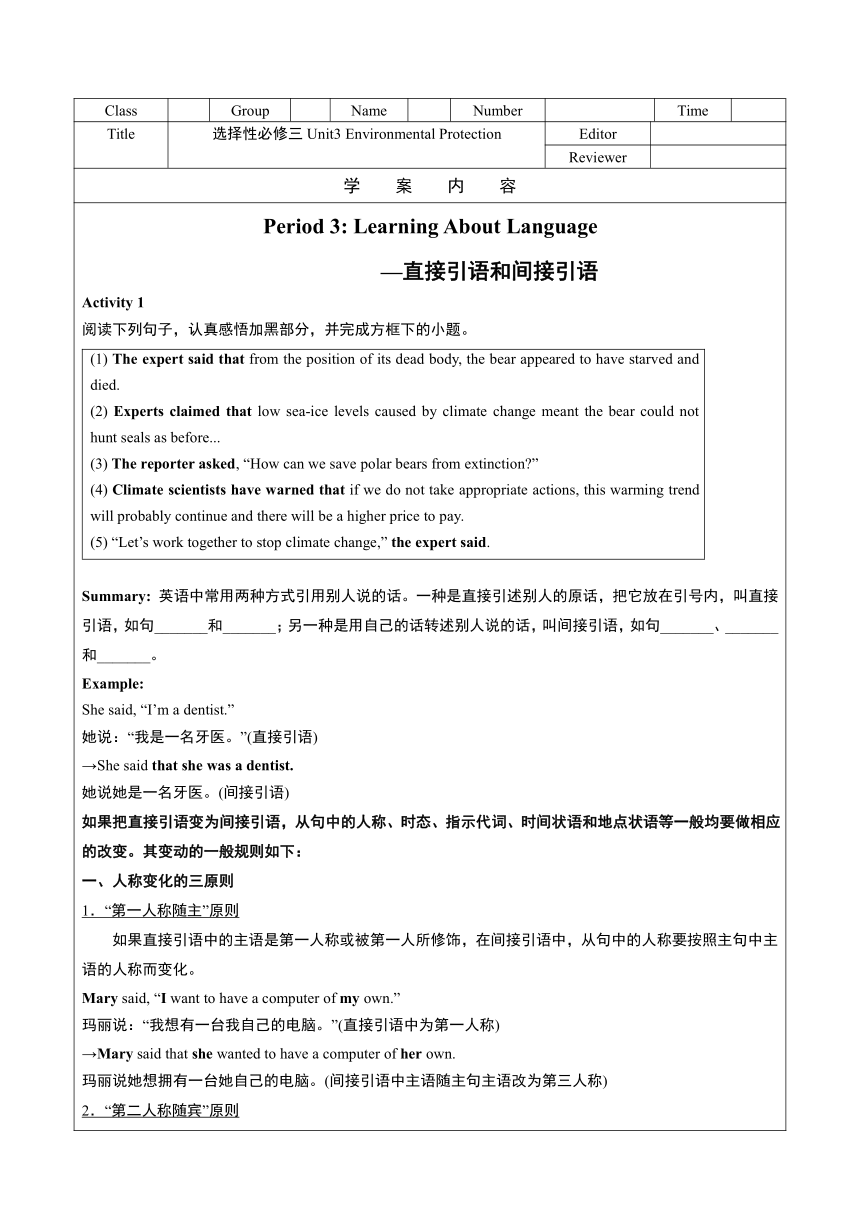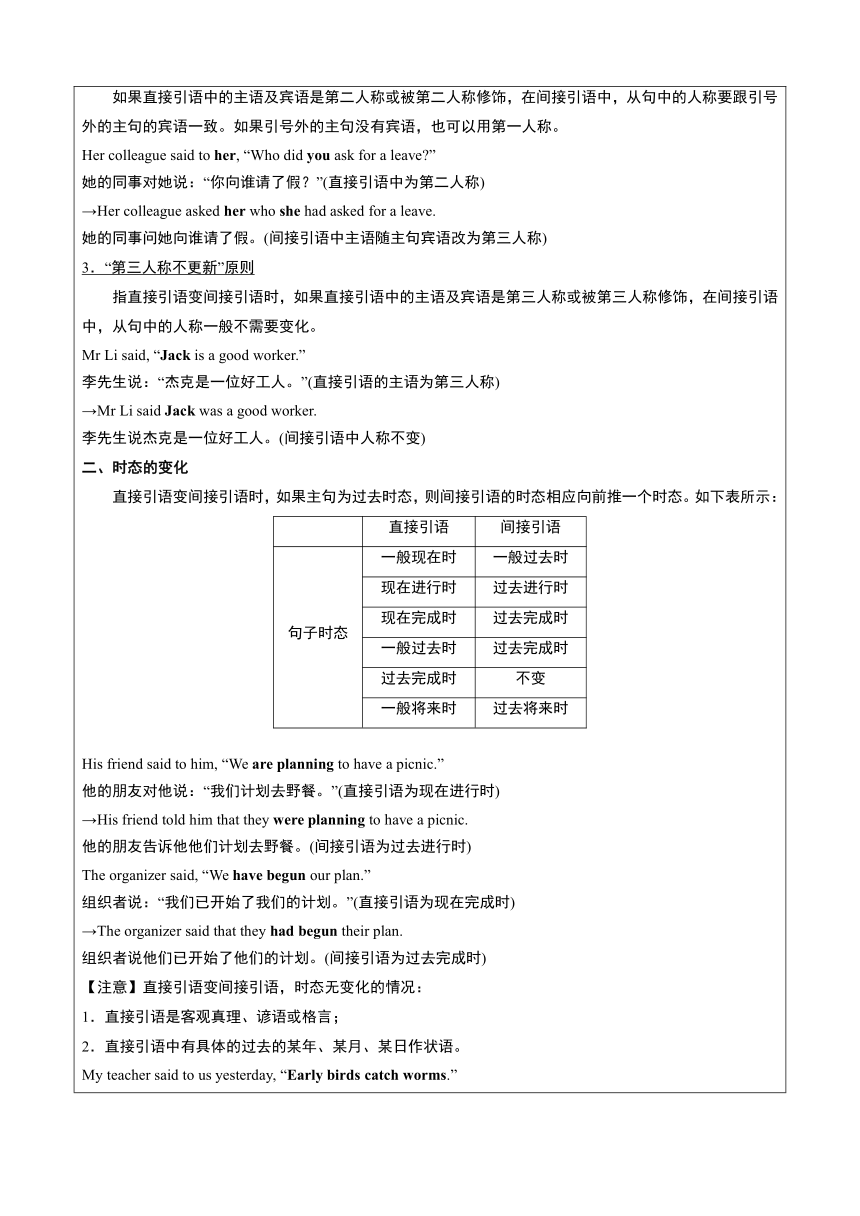人教版(2019)选择性必修第三册Unit 3 Environmental Protection Learning About Language 语法 导学案(表格式)
文档属性
| 名称 | 人教版(2019)选择性必修第三册Unit 3 Environmental Protection Learning About Language 语法 导学案(表格式) |

|
|
| 格式 | docx | ||
| 文件大小 | 19.3KB | ||
| 资源类型 | 教案 | ||
| 版本资源 | 人教版(2019) | ||
| 科目 | 英语 | ||
| 更新时间 | 2024-05-16 08:49:01 | ||
图片预览


文档简介
Class Group Name Number Time
Title 选择性必修三Unit3 Environmental Protection Editor
Reviewer
学 案 内 容
Period 3: Learning About Language —直接引语和间接引语 Activity 1 阅读下列句子,认真感悟加黑部分,并完成方框下的小题。 (1) The expert said that from the position of its dead body, the bear appeared to have starved and died. (2) Experts claimed that low sea-ice levels caused by climate change meant the bear could not hunt seals as before... (3) The reporter asked, “How can we save polar bears from extinction ” (4) Climate scientists have warned that if we do not take appropriate actions, this warming trend will probably continue and there will be a higher price to pay. (5) “Let’s work together to stop climate change,” the expert said.
Summary: 英语中常用两种方式引用别人说的话。一种是直接引述别人的原话,把它放在引号内,叫直接引语,如句_______和_______;另一种是用自己的话转述别人说的话,叫间接引语,如句_______、_______和_______。 Example: She said, “I’m a dentist.” 她说:“我是一名牙医。”(直接引语) →She said that she was a dentist. 她说她是一名牙医。(间接引语) 如果把直接引语变为间接引语,从句中的人称、时态、指示代词、时间状语和地点状语等一般均要做相应的改变。其变动的一般规则如下: 一、人称变化的三原则 1.“第一人称随主”原则 如果直接引语中的主语是第一人称或被第一人所修饰,在间接引语中,从句中的人称要按照主句中主语的人称而变化。 Mary said, “I want to have a computer of my own.” 玛丽说:“我想有一台我自己的电脑。”(直接引语中为第一人称) →Mary said that she wanted to have a computer of her own. 玛丽说她想拥有一台她自己的电脑。(间接引语中主语随主句主语改为第三人称) 2.“第二人称随宾”原则 如果直接引语中的主语及宾语是第二人称或被第二人称修饰,在间接引语中,从句中的人称要跟引号外的主句的宾语一致。如果引号外的主句没有宾语,也可以用第一人称。 Her colleague said to her, “Who did you ask for a leave ” 她的同事对她说:“你向谁请了假?”(直接引语中为第二人称) →Her colleague asked her who she had asked for a leave. 她的同事问她向谁请了假。(间接引语中主语随主句宾语改为第三人称) 3.“第三人称不更新”原则 指直接引语变间接引语时,如果直接引语中的主语及宾语是第三人称或被第三人称修饰,在间接引语中,从句中的人称一般不需要变化。 Mr Li said, “Jack is a good worker.” 李先生说:“杰克是一位好工人。”(直接引语的主语为第三人称) →Mr Li said Jack was a good worker. 李先生说杰克是一位好工人。(间接引语中人称不变) 二、时态的变化 直接引语变间接引语时,如果主句为过去时态,则间接引语的时态相应向前推一个时态。如下表所示: 直接引语间接引语句子时态一般现在时一般过去时现在进行时过去进行时现在完成时过去完成时一般过去时过去完成时过去完成时不变一般将来时过去将来时
His friend said to him, “We are planning to have a picnic.” 他的朋友对他说:“我们计划去野餐。”(直接引语为现在进行时) →His friend told him that they were planning to have a picnic. 他的朋友告诉他他们计划去野餐。(间接引语为过去进行时) The organizer said, “We have begun our plan.” 组织者说:“我们已开始了我们的计划。”(直接引语为现在完成时) →The organizer said that they had begun their plan. 组织者说他们已开始了他们的计划。(间接引语为过去完成时) 【注意】直接引语变间接引语,时态无变化的情况: 1.直接引语是客观真理、谚语或格言; 2.直接引语中有具体的过去的某年、某月、某日作状语。 My teacher said to us yesterday, “Early birds catch worms.” 昨天老师对我们说:“早起的鸟儿有虫吃。”(直接引语是谚语) →My teacher told us yesterday that early birds catch worms. 昨天老师告诉我们早起的鸟儿有虫吃。(间接引语时态不变) 三、指示代词、时间状语、地点状语及方向性动词的变化 引语 用词直接引语间接引语指示代词this这个that那个these这些those那些时间状语now现在then那时today今天that day那天this morning今天上午that morning那天上午tonight今天晚上that night那天晚上tomorrow明天the next/following day第二天yesterday昨天the day before前一天last night昨天晚上the night before前一天晚上the day before yesterday前天two days before两天前three days ago三天前three days before三天前next week下一周the next/following week第二周ago(至今)以前before(那时)以前地点状语here这儿there那儿方向性动词bring带来take带走come来go去
She asked,“Is this book his ” 她问:“这本书是他的吗?”(直接引语中用this) →She asked whether that book was his. 她问那本书是不是他的。(间接引语中改为that) “I’ll be very busy today, ” said the man. 那个人说:“我今天会很忙。”(直接引语中用today) →The man said he would be very busy that day. 那个人说那天他会很忙。(间接引语中改为that day) 四、连接词的选择 1.直接引语是陈述句,变为间接引语时,常变成由that引导的宾语从句。在口语中,that可以省略。 He said, “I was cooking when the earthquake happened.” →He said (that) he was cooking when the earthquake happened. 2.直接引语是一般疑问句、选择疑问句或反意疑问句时,间接引语中用whether(...or ...或...or not)或if引导。 He said, “Are you interested in English?” →He asked (me) if/whether I was interested in English. 【注意】如果主句中谓语动词是said,则将其改为asked。 3.直接引语为特殊疑问句时,间接引语仍用原句中的特殊疑问词来引导,其余的变化遵照直接引语和间接引语之间的转换规则来进行。 “What’s your name ” he asked me. →He asked me what my name was. 【注意】疑问句的直接引语变间接引语时,要把疑问语序变成陈述语序。 五、直接引语为祈使句时的变化 当直接引语为祈使句,变间接引语时主句的谓语动词应根据直接引语的口气换用ask,invite,advise,warn,tell,order等词,而原直接引语中的谓语动词则变为不定式。 He said to me,“Don’t be late tomorrow.” →He told me not to be late the next day. The official said,“Get ready before lunch.” →The official ordered us to get ready before lunch. 【随堂训练】 Ⅰ. 将下列直接引语和间接引语完成互换。 1.He asked the boy why he had been late again. →He asked the boy, “______________________________” 2.He asked me to shut the window. →He said to me, “_____________________________” 3.The doctor said to me, “Don’t drink too much.” →The doctor told me _____________________. 4.The old man said, “The boys over there are playing football.” →The old man said that _________________________________. 5.The teacher told us that we would have an English test the next Saturday. →The teacher said to us, “_______________________________________” II. 用间接引语翻译句子 1.Jane问Jack当她在公共汽车上碰到他时他打算去哪里。 ___________________________________________________________________________________________ 2.他说他那天早上遇到史密斯先生了。 ___________________________________________________________________________________________3.Laura询问我们能够做些什么来帮助野生动物。 ___________________________________________________________________________________________ 4.他问中国那些城市是适合居住的。 ___________________________________________________________________________________________ 5.那个男孩问我,他是否应该把那篇文章限制在300字。 ___________________________________________________________________________________________ ⅡI. 根据括号内的汉语提示完成下列短文。 A few minutes later, the other two cyclists arrived. They were shocked to find Mac’s bicycle lying on the road, his tent bag torn and Mac just like a drowned mouse. They asked anxiously 1. ____________________(到底发生了什么).Mac responded breathlessly that 2. ______________________(他差点被一只狼吃掉). When told about 3. ______________________(Mac经历了什么), they couldn’t help screaming out, “What a narrow escape!” “Yes, without their timely help, 4. ______________________________(我早已经是狼的盘中餐了).” Mac’s friends were also thankful to Paul and Becky. Afraid that there might be more potential dangers ahead, Paul and Becky asked kindly 5. ______________________________(他们是否需要搭便车). Mac and his friends answered with one voice, “6._______________(我们乐意).Thank you from the bottom of our hearts!”
Title 选择性必修三Unit3 Environmental Protection Editor
Reviewer
学 案 内 容
Period 3: Learning About Language —直接引语和间接引语 Activity 1 阅读下列句子,认真感悟加黑部分,并完成方框下的小题。 (1) The expert said that from the position of its dead body, the bear appeared to have starved and died. (2) Experts claimed that low sea-ice levels caused by climate change meant the bear could not hunt seals as before... (3) The reporter asked, “How can we save polar bears from extinction ” (4) Climate scientists have warned that if we do not take appropriate actions, this warming trend will probably continue and there will be a higher price to pay. (5) “Let’s work together to stop climate change,” the expert said.
Summary: 英语中常用两种方式引用别人说的话。一种是直接引述别人的原话,把它放在引号内,叫直接引语,如句_______和_______;另一种是用自己的话转述别人说的话,叫间接引语,如句_______、_______和_______。 Example: She said, “I’m a dentist.” 她说:“我是一名牙医。”(直接引语) →She said that she was a dentist. 她说她是一名牙医。(间接引语) 如果把直接引语变为间接引语,从句中的人称、时态、指示代词、时间状语和地点状语等一般均要做相应的改变。其变动的一般规则如下: 一、人称变化的三原则 1.“第一人称随主”原则 如果直接引语中的主语是第一人称或被第一人所修饰,在间接引语中,从句中的人称要按照主句中主语的人称而变化。 Mary said, “I want to have a computer of my own.” 玛丽说:“我想有一台我自己的电脑。”(直接引语中为第一人称) →Mary said that she wanted to have a computer of her own. 玛丽说她想拥有一台她自己的电脑。(间接引语中主语随主句主语改为第三人称) 2.“第二人称随宾”原则 如果直接引语中的主语及宾语是第二人称或被第二人称修饰,在间接引语中,从句中的人称要跟引号外的主句的宾语一致。如果引号外的主句没有宾语,也可以用第一人称。 Her colleague said to her, “Who did you ask for a leave ” 她的同事对她说:“你向谁请了假?”(直接引语中为第二人称) →Her colleague asked her who she had asked for a leave. 她的同事问她向谁请了假。(间接引语中主语随主句宾语改为第三人称) 3.“第三人称不更新”原则 指直接引语变间接引语时,如果直接引语中的主语及宾语是第三人称或被第三人称修饰,在间接引语中,从句中的人称一般不需要变化。 Mr Li said, “Jack is a good worker.” 李先生说:“杰克是一位好工人。”(直接引语的主语为第三人称) →Mr Li said Jack was a good worker. 李先生说杰克是一位好工人。(间接引语中人称不变) 二、时态的变化 直接引语变间接引语时,如果主句为过去时态,则间接引语的时态相应向前推一个时态。如下表所示: 直接引语间接引语句子时态一般现在时一般过去时现在进行时过去进行时现在完成时过去完成时一般过去时过去完成时过去完成时不变一般将来时过去将来时
His friend said to him, “We are planning to have a picnic.” 他的朋友对他说:“我们计划去野餐。”(直接引语为现在进行时) →His friend told him that they were planning to have a picnic. 他的朋友告诉他他们计划去野餐。(间接引语为过去进行时) The organizer said, “We have begun our plan.” 组织者说:“我们已开始了我们的计划。”(直接引语为现在完成时) →The organizer said that they had begun their plan. 组织者说他们已开始了他们的计划。(间接引语为过去完成时) 【注意】直接引语变间接引语,时态无变化的情况: 1.直接引语是客观真理、谚语或格言; 2.直接引语中有具体的过去的某年、某月、某日作状语。 My teacher said to us yesterday, “Early birds catch worms.” 昨天老师对我们说:“早起的鸟儿有虫吃。”(直接引语是谚语) →My teacher told us yesterday that early birds catch worms. 昨天老师告诉我们早起的鸟儿有虫吃。(间接引语时态不变) 三、指示代词、时间状语、地点状语及方向性动词的变化 引语 用词直接引语间接引语指示代词this这个that那个these这些those那些时间状语now现在then那时today今天that day那天this morning今天上午that morning那天上午tonight今天晚上that night那天晚上tomorrow明天the next/following day第二天yesterday昨天the day before前一天last night昨天晚上the night before前一天晚上the day before yesterday前天two days before两天前three days ago三天前three days before三天前next week下一周the next/following week第二周ago(至今)以前before(那时)以前地点状语here这儿there那儿方向性动词bring带来take带走come来go去
She asked,“Is this book his ” 她问:“这本书是他的吗?”(直接引语中用this) →She asked whether that book was his. 她问那本书是不是他的。(间接引语中改为that) “I’ll be very busy today, ” said the man. 那个人说:“我今天会很忙。”(直接引语中用today) →The man said he would be very busy that day. 那个人说那天他会很忙。(间接引语中改为that day) 四、连接词的选择 1.直接引语是陈述句,变为间接引语时,常变成由that引导的宾语从句。在口语中,that可以省略。 He said, “I was cooking when the earthquake happened.” →He said (that) he was cooking when the earthquake happened. 2.直接引语是一般疑问句、选择疑问句或反意疑问句时,间接引语中用whether(...or ...或...or not)或if引导。 He said, “Are you interested in English?” →He asked (me) if/whether I was interested in English. 【注意】如果主句中谓语动词是said,则将其改为asked。 3.直接引语为特殊疑问句时,间接引语仍用原句中的特殊疑问词来引导,其余的变化遵照直接引语和间接引语之间的转换规则来进行。 “What’s your name ” he asked me. →He asked me what my name was. 【注意】疑问句的直接引语变间接引语时,要把疑问语序变成陈述语序。 五、直接引语为祈使句时的变化 当直接引语为祈使句,变间接引语时主句的谓语动词应根据直接引语的口气换用ask,invite,advise,warn,tell,order等词,而原直接引语中的谓语动词则变为不定式。 He said to me,“Don’t be late tomorrow.” →He told me not to be late the next day. The official said,“Get ready before lunch.” →The official ordered us to get ready before lunch. 【随堂训练】 Ⅰ. 将下列直接引语和间接引语完成互换。 1.He asked the boy why he had been late again. →He asked the boy, “______________________________” 2.He asked me to shut the window. →He said to me, “_____________________________” 3.The doctor said to me, “Don’t drink too much.” →The doctor told me _____________________. 4.The old man said, “The boys over there are playing football.” →The old man said that _________________________________. 5.The teacher told us that we would have an English test the next Saturday. →The teacher said to us, “_______________________________________” II. 用间接引语翻译句子 1.Jane问Jack当她在公共汽车上碰到他时他打算去哪里。 ___________________________________________________________________________________________ 2.他说他那天早上遇到史密斯先生了。 ___________________________________________________________________________________________3.Laura询问我们能够做些什么来帮助野生动物。 ___________________________________________________________________________________________ 4.他问中国那些城市是适合居住的。 ___________________________________________________________________________________________ 5.那个男孩问我,他是否应该把那篇文章限制在300字。 ___________________________________________________________________________________________ ⅡI. 根据括号内的汉语提示完成下列短文。 A few minutes later, the other two cyclists arrived. They were shocked to find Mac’s bicycle lying on the road, his tent bag torn and Mac just like a drowned mouse. They asked anxiously 1. ____________________(到底发生了什么).Mac responded breathlessly that 2. ______________________(他差点被一只狼吃掉). When told about 3. ______________________(Mac经历了什么), they couldn’t help screaming out, “What a narrow escape!” “Yes, without their timely help, 4. ______________________________(我早已经是狼的盘中餐了).” Mac’s friends were also thankful to Paul and Becky. Afraid that there might be more potential dangers ahead, Paul and Becky asked kindly 5. ______________________________(他们是否需要搭便车). Mac and his friends answered with one voice, “6._______________(我们乐意).Thank you from the bottom of our hearts!”
